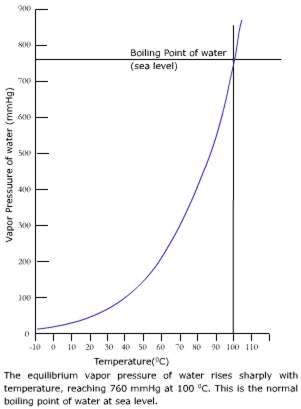I understand that the only reason liquids exist as liquids is because of the earth's atmospheric pressure and in vacuum they would all boil. But what is it that having an equal vapour pressure enables in a liquid that it spontaneously starts bubbling and changes to gas. Does this make the net pressure zero in some way? Thanks.
-
$\begingroup$ this is a question that requires to build a lot of physics background for the answer to be understood.have a look here hyperphysics.phy-astr.gsu.edu/hbase/thermo/phase.html $\endgroup$– anna vCommented Sep 14, 2018 at 11:16
-
$\begingroup$ Re, "Earth's atmospheric pressure." It's enough to just say "pressure." Liquids can exist in spaces that do not communicate with Earth's atmosphere. $\endgroup$– user205719Commented Sep 14, 2018 at 15:41
2 Answers
Whether a liquid evaporates or not is not directly affected by the total atmospheric pressure, but rather by the partial pressure of that liquid's vapor in the air.
For a liquid to be in equilibrium with its vapor so that no net evaporation or condensation occurs, the partial pressure of the liquid's vapor has to be equal to a certain value called the vapor pressure. For a given liquid, vapor pressure generally increases with temperature.
Consider water at room temperature for example. If you take a cup of water and place it out in open air, water molecules at the surface will evaporate and form a layer just above the surface where the partial pressure of water vapor is equal to vapor pressure, and this will stop water from boiling. Water vapor can get diffused in the atmosphere in which case more water will evaporate from the surface to get the partial pressure back to vapor pressure. The point is: at room temperature partial pressure of water vapor can be equal to vapor pressure.
Now if you keep heating up the water, its vapor pressure will keep increasing, and the partial pressure of water will increase along with it to keep the water in equilibrium. However, at some point (at $100^\circ\text{C}$) vapor pressure becomes equal to the total atmospheric pressure. The water vapor is open to the atmosphere, so its partial pressure cannot become larger than the total atmospheric pressure, and thus if you keep heating the water afterwards, it will start boiling.
-
$\begingroup$ So if a closed system is taken with some amount of water vapour equal to atmospheric pressure already present then the liquid will not boil at it's expected temperature? $\endgroup$– AureliusCommented Sep 12, 2023 at 18:14
-
$\begingroup$ Another question, if boiling point is the temperature at which vapour pressure is equal to atmospheric pressure then in vacuum, needed vapour pressure should be zero? Why then will a liquid boil in vacuum? $\endgroup$– AureliusCommented Sep 12, 2023 at 18:17
But what is it that having an equal vapor pressure enables in a liquid that it spontaneously starts bubbling and changes to gas.
As shown on the graph below (copied from this site), the pressure of water vapor at which it reaches dynamic equilibrium with liquid water changes with temperature.
So, if the temperature of the water in a kettle is $70^{\circ}C$, the pressure of vapor inside micro air bubbles, which is where most vapor bubbles get started, is on the order of $300mmHg$, while the pressure outside the bubbles exceeds the atmospheric pressure, $760mmHg$. The reason the bubbles do not collapse is because they are filled with hot air, but they do not grow much either, since the supply of air in the water is limited.
As the temperature rises, the vapor pressure in the air bubbles grows, but, as long as it is below the atmospheric pressure, the balance of external and internal forces, acting on the bubbles, is maintained and the size of the bubbles does not increase much.
At last, at about $100^{\circ}C$, when the vapor pressure exceeds the atmospheric pressure by a certain margin, the internal pressure in the bubbles will exceed the external pressure and the bubbles will start expanding. Since, given sufficient supply of heat, the supply of vapor in the water is practically unlimited, the bubbles will grow quickly before they rise and pop at the surface.
In summary, a sudden bubbling begins, when the vapor pressure exceeds the atmospheric pressure, because, at that point (boiling point), the internal pressure in the bubbles exceeds the external pressure and, as a result, the bubbles start expanding.

